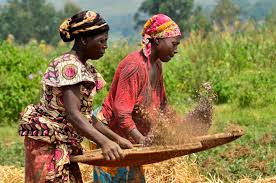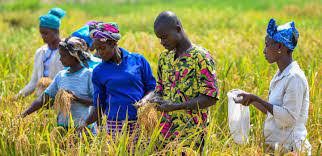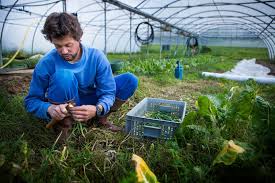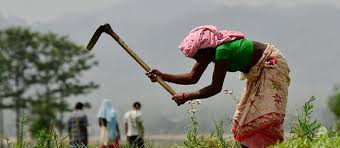Agriculture is the science and practice of cultivating plants, raising animals, and managing various natural resources to produce food, fiber, medicinal plants, and other essential products that sustain human life.
Originating thousands of years ago, agriculture has evolved from simple subsistence farming to a highly specialized and technologically advanced industry. Its primary purpose is to meet human needs by producing food and raw materials, but agriculture also plays a crucial role in supporting economies, providing employment, and maintaining ecological balance.
The scope of agriculture is vast and encompasses numerous activities and sectors. It includes crop cultivation, livestock rearing, forestry, fisheries, and agroforestry, each contributing to the production of a diverse range of products.
Agriculture extends beyond mere food production; it covers areas such as horticulture (growing fruits, vegetables, and flowers), aquaculture (raising fish and other aquatic organisms), and even biotechnology, which involves the use of science to enhance crop and animal production.
Furthermore, agriculture involves various processes, including soil preparation, planting, irrigation, pest control, harvesting, and marketing. Each of these steps is essential for ensuring high-quality, sustainable production.
In addition to its traditional roles, modern agriculture addresses global challenges like climate change, food security, and sustainable development. Innovative practices, such as precision farming, organic agriculture, and conservation tillage, have become integral to making agriculture more efficient and environmentally friendly.
The sector has also expanded to include agricultural research and technology, aiming to improve yields, enhance crop resilience, and reduce resource use. As the world’s population grows, agriculture’s scope continues to broaden, adapting to meet rising food demand while prioritizing sustainability, biodiversity, and resource management.
This dynamic field remains vital for human survival and global prosperity, bridging the gap between natural resources and human needs.
Historical Overview of Agriculture

1. Prehistoric Agriculture: Agriculture began around 10,000 years ago during the Neolithic Revolution when humans transitioned from nomadic lifestyles to settled farming communities. This shift allowed for the domestication of plants and animals.
2. Ancient Civilizations: As societies developed, agriculture became more advanced. Civilizations such as the Mesopotamians, Egyptians, and Indus Valley farmers used irrigation, crop rotation, and other techniques to enhance production.
3. Agricultural Innovations: The Middle Ages saw the introduction of new tools, such as the plow and the horse collar, which improved farming efficiency. The Agricultural Revolution in the 18th century introduced crop rotation and selective breeding, significantly increasing yields.
4. Modern Agriculture: In the 20th century, advancements in technology, such as mechanization, chemical fertilizers, and genetically modified organisms (GMOs), transformed agriculture into a highly productive industry.
Branches of Agriculture
1. Crop Production: Focuses on the cultivation of plants for food, fiber, and fuel. It includes various methods such as horticulture, agronomy, and organic farming.
2. Animal Husbandry: Involves the breeding and management of livestock for meat, dairy, wool, and other animal products. Key practices include feeding, breeding, and health management.
3. Agricultural Engineering: Combines engineering principles with agricultural practices to develop equipment, structures, and systems for efficient farming.
4. Agronomy: The science of soil management and crop production, emphasizing the relationship between crops, soil, and the environment.
5. Horticulture: The cultivation of garden crops, including fruits, vegetables, flowers, and ornamental plants.
6. Forestry: The management and cultivation of forests and trees for timber, paper, and other forest products.
Read Also: Tangerine and Mandarin Trunk: Economic Importance, Uses and By-Products
Importance of Agriculture in Society

1. Food Security: Agriculture is the primary source of food, providing essential nutrients for human survival and health. It plays a crucial role in ensuring food availability and access for populations.
2. Economic Contribution: Agriculture contributes significantly to the economy, providing jobs, supporting rural development, and driving trade. Many countries rely on agricultural exports for their economic stability.
3. Environmental Stewardship: Sustainable agricultural practices can enhance biodiversity, improve soil health, and protect water resources. Agriculture can also play a role in carbon sequestration and mitigating climate change.
4. Cultural Significance: Agriculture shapes cultures and traditions, influencing diets, cuisines, and social practices. It is deeply intertwined with the identity and heritage of communities worldwide.
5. Research and Innovation: Agricultural research drives innovations that improve crop yields, pest resistance, and sustainability, addressing challenges such as climate change and population growth.
Economic Impact of Agriculture
1. Contribution to GDP: Agriculture significantly contributes to the Gross Domestic Product (GDP) of many countries, especially in developing nations. It provides a substantial source of income and economic stability.
2. Employment Generation: Agriculture is a major source of employment worldwide, providing jobs for billions of people, particularly in rural areas. It supports livelihoods and helps reduce poverty.
3. Export Revenue: Agricultural products are vital exports for many countries, generating revenue and contributing to foreign exchange earnings. This trade supports national economies and promotes global commerce.
4. Supply Chain Development: Agriculture fosters the development of supply chains, including processing, transportation, and marketing, creating additional economic activities and job opportunities.
5. Rural Development: The agricultural sector promotes rural development by improving infrastructure, services, and access to markets. Investments in agriculture can lead to enhanced living standards in rural communities.
Read Also: How To Grow, Use and Care For Threespike Goosegrass (Eleusine Tristachya)
Scope of Agriculture in Modern Times

1. Technological Advancements: Modern agriculture is characterized by innovations such as precision farming, biotechnology, and automation, which enhance productivity and efficiency.
2. Sustainable Practices: There is a growing emphasis on sustainable agricultural practices that balance production with environmental protection. This includes organic farming, agroforestry, and integrated pest management.
3. Globalization of Agriculture: Global trade has expanded agricultural markets, allowing countries to import and export food products, which can enhance food security and diversify diets.
4. Climate Resilience: Modern agriculture is increasingly focusing on climate resilience through adaptive practices, research, and technologies that mitigate the impacts of climate change.
5. Urban Agriculture: The rise of urban agriculture is reshaping food production, allowing cities to produce fresh food locally and reduce dependence on rural supply chains.
Challenges Facing the Agricultural Sector
1. Climate Change: Agriculture is significantly affected by climate change, leading to unpredictable weather patterns, extreme events, and shifting growing seasons. These factors threaten food production and security.
2. Resource Scarcity: The availability of essential resources such as water and arable land is declining due to overexploitation and urbanization. This scarcity poses challenges for sustainable agricultural practices.
3. Economic Inequality: Many farmers, particularly smallholders, face economic challenges, including access to credit, markets, and technology. This inequality can hinder agricultural development and food security.
4. Pest and Disease Management: Increased incidences of pests and diseases can negatively impact crop yields and livestock health. Farmers must adapt their practices to manage these threats effectively.
5. Policy and Regulatory Issues: Agricultural policies and regulations can create barriers to entry for new farmers and impact production practices. Supportive policies are needed to promote sustainable and equitable agriculture.
Agriculture has a profound economic impact, contributing to GDP, employment, and rural development. Its scope in modern times is evolving with technological advancements and sustainable practices, yet it faces significant challenges such as climate change, resource scarcity, and economic inequality.
Understanding these aspects is essential for promoting a resilient and productive agricultural sector that can meet the demands of the future.
Agriculture is a multifaceted field that has evolved over thousands of years, playing an essential role in human society. Its importance extends beyond food production, impacting economic stability, environmental health, and cultural identity.
Understanding agriculture’s definition, history, branches, and significance is vital for appreciating its role in our world today.
Do you have any questions, suggestions, or contributions? If so, please feel free to use the comment box below to share your thoughts. We also encourage you to kindly share this information with others who might benefit from it. Since we can’t reach everyone at once, we truly appreciate your help in spreading the word. Thank you so much for your support and for sharing!
Read Also: The Role of Livestock Farming in a Sustainable Food System
Frequently Asked Questions
We will update this section soon.

